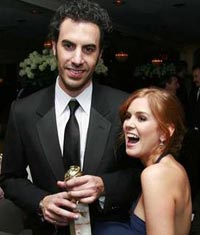 You have to hand it to “Family Guy” for topicality. Fresh off last month’s run-in with Sarah Palin about her son with Down syndrome, animated sitcom “The Family Guy” opened Sunday night with a skit about Terri Schiavo, the brain-damaged Florida woman whose fate was the subject of a right-to-die court battle in 2005.
You have to hand it to “Family Guy” for topicality. Fresh off last month’s run-in with Sarah Palin about her son with Down syndrome, animated sitcom “The Family Guy” opened Sunday night with a skit about Terri Schiavo, the brain-damaged Florida woman whose fate was the subject of a right-to-die court battle in 2005.
The Schiavo bit comes just as the Terri Schindler Schiavo Foundation has organized a fundraising concert to commemorate the fifth anniversary of Schiavo’s death. Now, I admit I learned about the milestone only after the Schiavo family protested the “Family Guy” shtik about Schiavo, a musical number that calls her “the most expensive plant you’ll ever see” and includes in her hospital room a machine that “dispenses gravy for her mashed potato brains.”
When a “Family Guy” episode in mid-February featured a Down syndrome character who identified her mom as the “former governor of Alaska,” Palin’s daughter Bristol complained that it was a cheap shot. Not so, said the Down syndrome actress who played the role for “Family Guy”: the former governor of Alaska had earned the reference by toting her son, Trig, around to gain sympathy and votes. “It’s called sarcasm,” the actress said.
Is the argument now that, if you’re going to be singing songs in the name of Terri Schiavo, you deserve to have insensitive persiflage aired about her? The problem is that the song’s rough bludgeoning at Schiavo’s mental state–the facts of which, for the record, it gets wrong–doesn’t spoof the political stage-managing that went on around the court case and her eventual death. You can satirize the modern political media circus all you like, but when you confuse the humans with their media images, you’ve joined the mill.
What’s especially puzzling about the Schiavo skit is that it kicks off a show about gossip sites (lke TMZ or, in a milder form, this one) that make mountains out of molecular misdeeds of celebrities. (The family guy of the title, a sort of postmodern Archie Bunker, is psyched when his harrassing video of Richard Dreyfuss makes TMZ’s televised report.) It’s hard to figure how ridiculing a bad situation, long since settled, is any less gratuitous, or less worthy of scorn.


